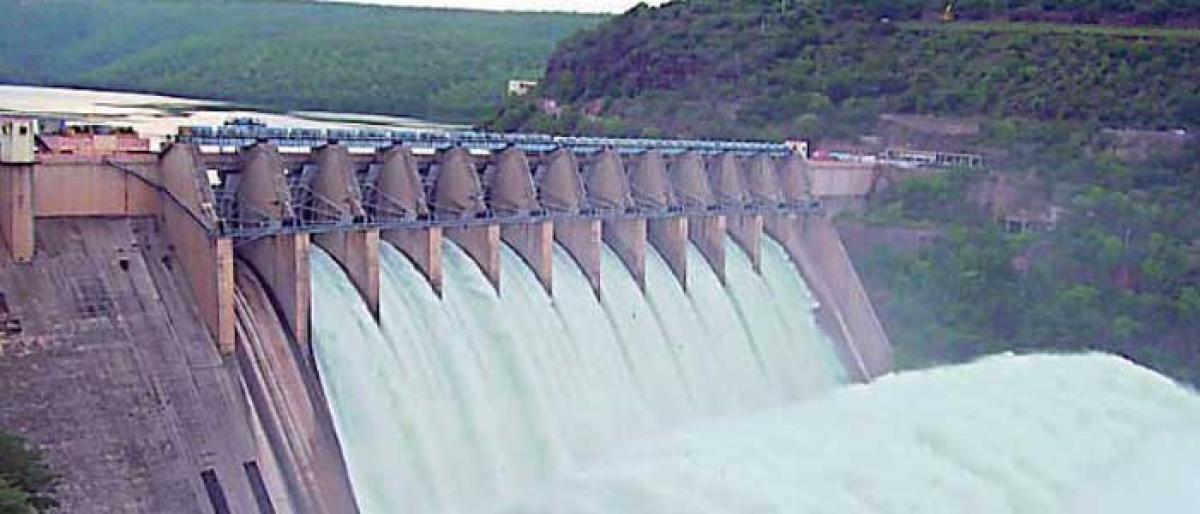Live
- Unveiling the Hidden Gems: Surprising Health Benefits of Garlic Peels
- Overcoming Sleep Struggles: A Comprehensive Guide to a Restful Night
- RTC bus hit the auto
- MLA Kuchukula Rajesh Reddy participated in the Birappa festival
- DMHO starts awareness campaign on Malaria
- World Intellectual Property Day 2024: Date, History, Significance, and Everything You Need to Know
- Shiv Sena-UBT manifesto assures dignity to all states; ‘no’ to polluting nuclear, refinery mega projects
- IPL 2024: Delhi Capitals sign Gulbadin Naib to replace injured Mitchell Marsh
- Delhi court grants 30-day extension to police to conclude probe in Parliament security breach case
- Cash, liquor, drugs valued at Rs 321 crore confiscated in Punjab
Just In

With larger issues relating to inter-state sharing of Krishna water remaining unaddressed, it looks like Telangana State cannot help bearing the brunt of drinking water crisis whenever there is deficit rainfall. Some of the bifurcation blues have vanished. However, the long-pending issue over proper sharing Krishna river water between Karnataka and the erstwhile Andhra Pradesh, as a way to addre
Hyderabad: With larger issues relating to inter-state sharing of Krishna water remaining unaddressed, it looks like Telangana State cannot help bearing the brunt of drinking water crisis whenever there is deficit rainfall. Some of the bifurcation blues have vanished. However, the long-pending issue over proper sharing Krishna river water between Karnataka and the erstwhile Andhra Pradesh, as a way to address acute drinking water problem in the State capital during periods of deficit rain, is still haunting the Telangana government.
This is evident from the fact that the Karnataka government turned a deaf ear to the Telangana government’s plea to release of 15 tmc of Krishna water to help meet the drinking water requirement in Hyderabad and fluoride-hit Nalgonda district. The TS government duly sent an official letter in this regard to Karnataka 10 days ago.
On August 8th, Telangana Irrigation Minister T Harish Rao shot off a letter to his Karnataka counterpart MB Patil, seeking immediate release of water. Although the TS Minister did highlight the acute drinking water crisis facing people in Hyderabad, his Karnataka ounterpart has not responded positively till date.
On Friday, water storage levels dipped to 500 ft, far below the dead storage level of 510 ft at Srisailam; while in Nagarjuna Sagar reservoir, the registered water level was only 780 ft. The full reservoir level (FRL) of the dam is 885 ft. A total of 650 mgd (million gallons per day) is required to meet the drinking water requirement in Hyderabad. Under these circumstances, the government could meet less than 50 per cent the water requirement in the city.
Top officials of the State Irrigation Department told The Hans India that the Karnataka government has been diverting inflows from the Krishna river at Almatti and Narayanpur dams to its locally created water bodies—Farm Ponds—for irrigation purpose.
The neighbouring State’s stance is that after all it has been utilising water within the quota earmarked for it by the Water tribunal.
All India Kisan Sabha Vice-President S Malla Reddy said that the Telangana government did not bring the drinking water requirement issue to the notice of either the Krishna River Management Board or the Apex Board headed by Union Ministry for Water Resources Uma Bharthi. As per the Brijesh Kumar Tribunal, it is mandatory for Karnataka to release 10 tmc to Telangana in June and July.
Still, the neighbouing State has not been releasing water on the pretext that the issue is pending in the Supreme Court. The recommendation made by the Bachawat Tribunal that the release of water should be done on pro rata basis is also not under implementation between Karnataka and Telangana.
Malla Reddy observed that in 2003 and 2004 then chief ministers N Chandrababu Naidu and YS Rajasekhara Reddy respectively requested the release of 15 tmc of water for drinking purpose, but in vain. The KCR government should take up the issue with the Centre and resolve the core issues that precipitate water crisis.
Telangana officials point out that there is no control over the utilisation of water by Karnataka, considering there is no official monitoring mechanism. As per the Brijesh Kumar Tribunal award, the Krishna Water Decision Implementation Board would have to be constituted. Due to legal wrangles, the board has not seen the light of the day.
According to official sources, Almatti is flush with 128 tmc water, against its full storage capacity of 129 tmc. It registered 5,000 cusecs inflows on Tuesday. Still, water has not been released, though the Irrigation Departments of the two Telugu States had requested the upstream States.

© 2024 Hyderabad Media House Limited/The Hans India. All rights reserved. Powered by hocalwire.com







